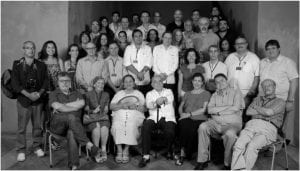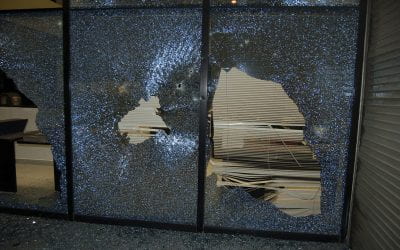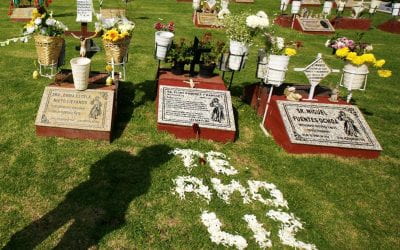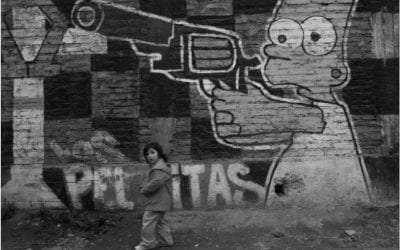New Journalists for a New World
Fifteen Years with Gabriel García Márquez’s Foundation

Gabriel Garcia Marquez (front row, center) and his wife, Mercedes, accompanying FNPI teachers and employees during a workshop in 2010. Photo by Jaime Abello.
I received a surprising phone call one day in late 1993, when I was the director of Telecaribe, a public television channel in Barranquilla, Colombia. The caller was none other than Gabriel García Márquez. “Will you invite me to dinner?” he asked me. “Of course, Gabito,” I answered, perplexed, calling him by the nickname used by his relatives and friends from Colombia’s Caribbean coast.
We agreed on a date for dinner—December 28, day of the Holy Innocents in the Catholic calendar, which is comparable to April Fools’ Day in the United States—and I hung up the phone without imagining that a new stage of my life was about to begin. On the appointed evening, I met with García Márquez, his wife, Mercedes, and a small group of mutual friends from Barranquilla in a restaurant well-known for its good cuisine and with a name appropriate for a Nobel Prize winner: The ABC Club, with the acronym standing for Art, Beauty and Culture.
Between whiskies, the celebrated author, then in his mid-sixties, recounted anecdotes about his beginnings as a reporter in Cartagena’s El Universal, where his first editor, Clemente Manuel Zabala, corrected his texts with a red pencil. He recalled how he shared both bar sprees and literary pleasures with his intellectual friends when he was a journalist at Barranquilla’s paper, El Heraldo. He also expressed his concern about the weighty theories in vogue still today in many communication and journalism schools, and of his fear of interviewers who trusted the mechanical parrot of the cassette recorder more than their own memories. He proclaimed his conviction that reporting is a literary genre, and that it would be good to have some workshops where veteran journalists could converse with young reporters about the carpentry of the trade. “What can be done?” I asked him. “Think about that,” was the only thing he said to me with the force of a mandate when I left him at the hotel.
Two months later, I ran into him at the Cartagena Film Festival opening. “Aha, and, what have you been thinking?” he asked me like a teacher who demands a homework assignment. “I met with some colleagues and I have some ideas ready,” I answered. “I expect you the day after tomorrow at five in my apartment,” he replied. The next day I went early to Barranquilla to draft a proposal. It was only two pages long, with a description, inspired by his ideas, outlining the institution what we eventually founded and named the Fundación para un Nuevo Periodismo Iberoamericano — FNPI (Foundation for a New Journalism in Ibero-America).
Little by little we began to build a network of supporters for the project, or as Gabo preferred to call them, “the accomplices.” We planned a program of workshops with a group of journalists headed by the Argentine writer Tomás Eloy Martínez, a veteran storyteller and founder of good newspapers that tended to fare badly for non-journalistic reasons. A year later, in April 1995, Mexican journalist and author Alma Guillermoprieto directed our first workshop, on long-form narrative journalism, with a group of ten journalists under the age of 30. Since then (through December, 2010), the FNPI has organized more than 300 workshops and seminars attended by more than 8,000 journalists from every single Latin American country. In fact, the FNPI has become one of the most active journalism training and professional development centers in the world.
There are more than a thousand communication and journalism schools in Latin America. What makes FNPI different? The answer lies in its focus on practical work, experience sharing and professional debate in an informal environment without academic requirements or theoretical pretensions. “Life will take care of deciding who is capable and who isn’t,” as García Márquez put it. With arithmetic simplicity, he argued that an essential factor in the defense of the integrity of a journalist, his or her independence, and at times even his or her life, is good professional training. This training can best be provided in practice-oriented workshops for small groups. In journalism, ethics is inseparable from technique.
From its headquarters in the colonial town of Cartagena, on the same street as the newspaper office where García Márquez learned the reporter’s craft in 1948, the FNPI has broadened its mission to include exchange seminars and debates on subjects relevant to journalism at the local and international level. It also confers the most prestigious and competitive journalism prize in Latin America and Spain, as well as a lifetime achievement award. The Foundation has developed resources for journalists such as specialized publications, a website, www.fnpi.org, and virtual networks, as well as a range of initiatives to collaborate with and support independent, public-spirited journalism, but its essential focus is still on the practical training workshops for reporters and editors with the vocation and aptitude necessary for researching stories and telling them in a creative manner. Outstanding journalists, writers and photographers from Europe, Latin America and the United States such as Alma Guillermoprieto, Jon Lee Anderson, Sergio Ramírez, María Teresa Ronderos, Francisco Goldman, Susan Meiselas, Stephen Ferry, Mónica González, Rosental Alves, Miguel Ángel Bastenier, Daniel Santoro, are among the master teachers who regularly lend their time for the Foundation´s workshops. A new generation of teachers is emerging of FNPI alumni, like Juanita León (Colombia), Julio Villanueva Chang (Perú), Cristian Alarcón (Chile-Argentina) and Boris Muñoz (Venezuela).
The Foundation is always looking for new ways to collaborate with journalists from all over the world. Over the years the FNPI has built a network with more than fifty like-minded organizations to support the goal of promoting better-informed societies by taking advantage of the digital media to promote investigative journalism and quality news coverage. Subjects that are vital to democracy and development of the countries in Latin America and the Caribbean, such as the electoral process, poverty, social change, environmental issues, business and economics reporting, and drug trafficking, are among the most important areas of effort and interest. For instance, the FNPI seminars have facilitated the exchange of knowledge and experience between reporters covering issues relating to organized crime and citizen safety with economists, anthropologists, sociologists, screenwriters, novelists and bloggers interested in studying the drug phenomenon. They are united around the proposition of seeking new visions and approaches in the treatment of a problem that has so many regional political and social ramifications. In other fields, the Foundation holds an on-line ethics clinic that has responded to more than a thousand specific cases; it is a pioneer in studies on the social responsibility of communications media enterprises in Latin America; and its gathering, “New Chroniclers of the Indies,” has been a platform for highlighting and promoting new authors and magazines devoted to narrative journalism in the region.
In the fifteen years and several months that have passed since the FNPI began to operate, fundamental changes have occurred in the craft, the business and the social function of journalism. Standards and values have changed, traditional media business structures have collapsed, and multiple journalistic experiments have been attempted. At the same time, wireless Internet and technological advancements have generated constant and formidable challenges to the capacity of journalists to identify, and to connect to, the interests of an increasingly fragmented public. It is a panorama that is both exciting and confusing, a context in which the Foundation is supporting innovation, experimentation and new initiatives without forgetting the need for the adaptation and transition of traditional media and journalists.
Some years ago, García Márquez and I were in Monterrey, Mexico, to present our annual New Journalism Awards. There had been several very intensive workdays, with a seminar on ethics, quality and journalistic enterprise, and it had concluded with a beautiful ceremony for the journalists from seven countries who received awards. There were even nighttime get-aways to enjoy salsa and vallenato, danced with the same flavor and gusto as in Colombia’s Caribbean. At the end we got together to talk about the programs of our Foundation. I will never forget the glow in Gabito’s eyes when he said, “And to think that all of this was in our imagination!”
Spring 2013, Volume XII, Number 3
Jaime Abello Banfi has been the general director and CEO of the Fundación Nuevo Periodismo Iberoamericano (FNPI), since 1995, when he worked on its creation with Gabriel García Márquez. A lawyer by training, he has nonetheless devoted his professional life to the media, where he seeks to protect and foster independence, creativity and freedom of information.
Margery Sorock translated this article.
“Those who come to the Foundation are brought there from every corner of Latin America, and every social niche. They range from green cub reporters to seasoned veterans well into their careers. There are those who are self-taught and poor and from obscure provincial newspapers, and others who are urban sophisticates, who have had the advantages of top-notch educations, world travel and good incomes. Some of them are already media stars, household names in their countries. But in Cartagena they are equals, and sit shoulder to shoulder as students. What brings them there is their desire to learn, to improve their skills at communicating their diverse realities, and, no doubt, the common hope that some of Gabo’s magic might rub off on them.”
—Jon Lee Anderson, The New Yorker
Related Articles
Under Fire in Mexico
It was past midnight, in the first minutes of Tuesday, August 18, 2009, when my cell phone rang with a call from the newsroom of El Siglo de Torreón, the daily in Torreón, Mexico, where I work as editor-in-chief. I thought it was a routine call about a breaking story. In a way it…
Midnight in Mexico
More than 60 Mexican journalists have been murdered and dozens more have disappeared since 2000, more than 30 in the past four years.
Every journalist in Mexico—sometimes even I, an American journalist—wakes up to ask the following questions: How far should I go today…
Investigative Journalism
It was the end of the year 2006. Six years of intense effort to create a newspaper to break the duopoly of the written media in Chile were coming to a close. Diario Siete (Seven News), which I founded and directed together with one of the best journalist teams in the country…




